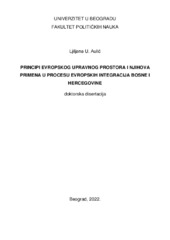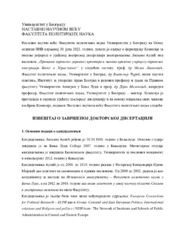Prikaz osnovnih podataka o disertaciji
Principi evropskog upravnog prostora i njihova primena u procesu evropskih integracija Bosne i Hercegovine
#The #principles of European administrative space and their application in the process of European integrations of Bosnia and Herzegovina
| dc.contributor.advisor | Milenković, Dejan | |
| dc.contributor.other | Jovanović, Milan | |
| dc.contributor.other | Đurić, Vladimir | |
| dc.creator | Aulić, Ljiljana U. | |
| dc.date.accessioned | 2022-12-08T20:36:33Z | |
| dc.date.available | 2022-12-08T20:36:33Z | |
| dc.date.issued | 2022-09-30 | |
| dc.identifier.uri | https://eteze.bg.ac.rs/application/showtheses?thesesId=8860 | |
| dc.identifier.uri | https://fedorabg.bg.ac.rs/fedora/get/o:27123/bdef:Content/download | |
| dc.identifier.uri | https://plus.cobiss.net/cobiss/sr/sr/bib/81841417 | |
| dc.identifier.uri | https://nardus.mpn.gov.rs/handle/123456789/21049 | |
| dc.description.abstract | Evropski upravni prostor (EAS) je neformalni acquis communautaire, na području javne uprave nastao usled proširenja Evopske unije, a koji postavlja minimalne standarde za zemlje kandidate u pitanjima reforme političkih institucija i javne uprave, posebno centralne državne uprave. Koncept stvaranja Evropskog upravnog prostora posmatra se kao konvergencija u smislu zajedničkog približavanja evropskom upravnom modelu. U središtu naučnog interesa disertacije vodili smo se pitanjem, u kojoj meri je moguće očekivati da primena principa Evropskog upravnog prostora funkcioniše u dezintegrisanom društvu kao što je Bosna i Hercegovina, gde je asimetričnost u pogledu unutrašnjeg uređenja entiteta jedno od specifičnih obeležja unutrašnje strukture i federalizma u Bosni i Hercegovini. Federacija Bosne i Hercegovine ima federalnu struktura (10 kantona), dok Republika Srpska ima unitarnu, tako da se na jednom delu teritorije Bosne i Hercegovine pojavljuje dvostruka federalna struktura. Dakle, problem Bosne i Hercegovine nije samo u institucionalnom kapacitetu za sprovođenje prava Evropske unije, već i sprovođenje domaćeg prava. Predmet istraživanja smo posmatrali u okviru procesa evropskih integracija, gde smo potvrdili da se demokratska transformacija i evropska integracija odvijaju istovremeno i da stoje u uzajamnom međuodnosu, koji je složen, kako u realnim političkim i društvenim odnosima tako i naučnom tretiranju ta dva procesa. Ključni koncept razumevanja i istraživanja tog međuodnosa nacionalne zemlje i EU jeste evropeizacija, koja deluje pozitivno i poticajno, na postautoritarnu demokratizaciju u tim državama što je posebno izraženo predpregovaračkoj (adaptacijskoj) fazi za članstvo u EU, koja se na slučaju Bosne i Hercegovine susrela sa problemima koji proizilaze iz ustavne strukture BiH, odnosno njenih elemenata definisanih ustavima entiteta i Ustavom BiH, ali i problemima postkonfliktnog društva. Administrativni kapacitet države kandidata za sprovođenje obaveza iz integracijskog procesa, procenjuje se metodom komparacije sa već postojećim administrativnim kapcitetima država članica, gde su administrativni kapaciteti BiH ocenjeni kao neefikasni, komlikovani i glomazni, a proces reforme javne uprave u ranoj fazi. Vodeći se ciljem istraživanja objasnili smo važnost primene principa u procesu evropskih integracija, imajući u vidu složenu institucionalnu i ustavnu specifičnost Bosne i Hercegovine, definisane u Aneksu IV Dejtonskog mirovnog sporazuma. Projektovanju reforme javne uprave prišli smo sa stanovišta uprave kao složenog sistema, koristeći se opštom hipotezom da „primena principa Evropskog upravnog prostora može da utiče na efikasno funkcionisanje asimetričnog unutrašnjeg uređenja entiteta, koristeći se skupom upravnih principa, vrednosti i standarda, obezbeđujući Bosni i Hercegovini da ispuni kriterijume evropskih integracija.“Osnovne metode koje smo koristili u disertacij su metode analize, sinteze, apstrahovanja, specijalizacije i generalizacije. Prema obuhvatu predmeta istraživanja koristili smo se i analizom naučnog sadržaja o Evropskom upravnom prostoru, njegovim principima, te strukturalnom analizom kojom smo došli do činioca predmeta istraživanja, zatim funkcionalnom analizom kojom smo utvrdili aktivnosti unutar procesa i faktorskom analizom koja nam je pomogla u saznanju determinirajućih činilaca. Primenom principa evropskog upravnog prostora, uvažavajući složenu strukturu Bosne i Hercegovine, izveli smo zaključak da će uprava ostati pod pritiskom institucija entiteta i njihovih centara političke moći, gde će uz primenu principa Evropskog upravnog prostora i pritisaka Evropske unije doći do brže dinamike reforme javne uprave. | sr |
| dc.description.abstract | The European Administrative Space (EAS) is an informal acquis communautaire in the domain of public administration which originated as the result of the expansion of EU and which sets minimal standards for candidate countries to fulfill in terms of political institution reforms and public administration, especially central state administration. The concept of EAS creation is viewed as a convergence in the sense of a unified approach to the European Administration model. At the core of this disertation’s scientific interest, we are guided by the question of the extent in which it is possible to expect that the application of EAS principles will function in a disintegrated society such as in Bosnia and Herzegovina, where asymmetry in terms of internal entity organization is one of the particularities of the internal structure and federalism in Bosnia and Herzegovina. The Federation of Bosnia and Herzegovina is federally structured (in 10 cantons), whereas Republika Srpska has a unitarian structure. Therefore, the problem with Bosnia and Herzegovina lies not only with their institutional capacity to execute the law of EU, but also their national law as well. We have observed the subject of this research within the processes involved in EU integrations, where we have established that the democratic transformation and European integration are taking place simultaneously and that they share a complex interrelationship both in terms of realistic political and societal relations as well as the scientific treatment of these two processes. The key concept of understanding and researching this interrelationship between a national country and EU is Europanization which has a positive and beneficial effect on postauthoritarian democratization in this country, which is especially prominent in the prenegotiational (adaptive) EU membership phase which has, in the case of Bosnia and Herzegovina, encountered problems originating from the country’s constitutional structure, or its elements which are defined by entity constitutions and the Bosnia and Herzegovina Constitution, but also the problems of a post-conflict society. The administrative capacity of candidate countries to carry out the obligations posed by the integration process is estimated using a method of comparison to existing administrative capacities of member countries where the administrative capacities of Bosnia and Herzegovina have been evaluated as inefficient, complicated and obtuse, while the process of public administration reform as still in its early stage. Guided by the goal of this research, we have explained the importance of applying EU integration principles, bearing in mind the complex institutional and constitutional particularity of Bosnia and Herzegovina, defined in the Annex IV of the Dayton Peace Agreement. We have approached reform projecting from the standpoint of management as a complex system, utilizing the general hypothesis that “applying the principles of EAS can impact the efficient functioning of an entity’s asymmetric internal organization, using a collection of administrative principles, values and standards, allowing Bosnia and Herzegovina to fufill the required criteria for European integration. “The basic methods used in the disertation include the methods of analysis, synthesis, abstraction, specialization and generalization. In accordance with the scope of the research subject, we have also utilized scientific content analysis regarding the European Administration Space, its principles and have used structural analysis to reach the subject research factor and then the functional analysis to establish the activities within the process and the factor analysis which has helped us to define the determinating factors. By applying the principles of EAS with regards to the complex structure of Bosnia and Herzegovina, we have drawn the conclusion that the administration will continue to endure pressure from entity institutions and their political power centers and that the dynamic of public administration reform will be faster with the application of EAS principles and EU pressure. | en |
| dc.format | application/pdf | |
| dc.language | sr | |
| dc.publisher | Универзитет у Београду, Факултет политичких наука | sr |
| dc.rights | openAccess | en |
| dc.rights.uri | https://creativecommons.org/licenses/by-nc-nd/4.0/ | |
| dc.source | Универзитет у Београду | sr |
| dc.subject | federalizam BiH | sr |
| dc.subject | evropeizacija | sr |
| dc.subject | proces integracije BiH u EU | sr |
| dc.subject | upravni sistem BiH | sr |
| dc.subject | Evropski upravni prostor | sr |
| dc.subject | principi EAS | sr |
| dc.subject | reforma javne uprave BiH | sr |
| dc.subject | dobro upravljanje | sr |
| dc.title | Principi evropskog upravnog prostora i njihova primena u procesu evropskih integracija Bosne i Hercegovine | sr |
| dc.title.alternative | #The #principles of European administrative space and their application in the process of European integrations of Bosnia and Herzegovina | en |
| dc.type | doctoralThesis | |
| dc.rights.license | BY-NC-ND | |
| dc.identifier.fulltext | http://nardus.mpn.gov.rs/bitstream/id/148662/Disertacija_12963.pdf | |
| dc.identifier.fulltext | http://nardus.mpn.gov.rs/bitstream/id/152590/Referat.pdf | |
| dc.identifier.rcub | https://hdl.handle.net/21.15107/rcub_nardus_21049 |



